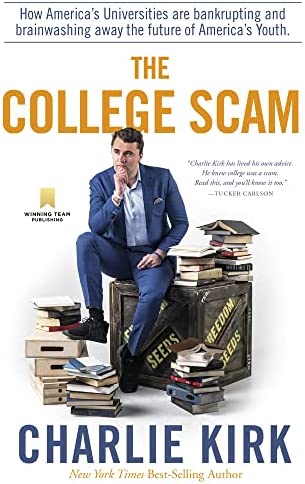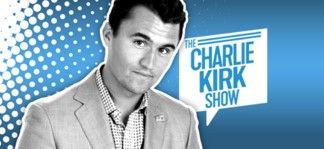The College Scam
By Charlie Kirk, Winning Team Publishing, 2022
Near the end of his extraordinary, eye-opening book, author and founder of the on-campus organization, Turning Point USA, writes: “I can already hear the critics of this book. In fact, I could write the reviews for them: ‘Charlie Kirk’s latest book is an exercise in anti-intellectualism. He attacks higher education, claiming that it’s smart to be stupid and stupid to be smart.’” This reviewer isn’t one of those critics.
While Kirk didn’t attend a university himself, he exposes with clarity, wit, and knowledge the frighteningly hostile situation on most college campuses. His original goal was to attend the U.S. Military Academy at West Point, and when he didn’t get an appointment, he set his sights on Baylor University in Waco, Texas. While visiting the Baylor campus, he met what he considers a very rare university president who encouraged him to take the time to pursue his dream of founding a youth organization before entering the university. So Kirk took “a gap year,” focused on building Turning Point USA, and never looked back.
 The author admits that he did take some community college courses, but he didn’t become a full-time student and never took out a student loan. Instead, through his research and experience with Turning Point USA and the students who represent the conservative organization on higher education campuses throughout the country, he makes a solid case for why most young people and their families would be wise to avoid The College Scam.
The author admits that he did take some community college courses, but he didn’t become a full-time student and never took out a student loan. Instead, through his research and experience with Turning Point USA and the students who represent the conservative organization on higher education campuses throughout the country, he makes a solid case for why most young people and their families would be wise to avoid The College Scam.
The focus of the book is the author’s ten-count indictment of how “the College Industry has become completely corrupt at student and taxpayer expense.” While readers won’t be surprised at Kirk’s 10 counts, or “troubling realities” of higher education today, few are likely to be aware of the extent of the destructiveness exposed in the book.
The first “count” of the author’s indictment is that, per the book’s title, “colleges and universities are running a scam.” While they promise students “an education that will prepare them for a rewarding career,” Kirk cites the “40 percent dropout rate” as his first piece of evidence to the contrary.
One of the many interesting anecdotes included in the book is a vignette about Sarah Rose Attman, who founded her own public relations firm but says she “learned nothing in college.” Kirk writes: “As a millennial, Sarah Rose Attman finds it kind of quaint that, in the past, people went to college to learn... But her complaint about college is not so much that it’s a waste of time (though it is). She fears that college does serious damage to young souls. She writes that college is ‘a breeding ground for a toxic, misogynistic, elitist social culture. A place where self-esteem goes to die.’”
The second count of Kirk’s indictment is that “a college education is ridiculously overpriced.” While he devotes Chapters Two and Three specifically to this topic and that of how colleges and universities have “become obscenely rich at student and taxpayer expense,” he continues to reference them throughout the book because they are staggering examples of corruption in higher education. The author describes many instances of lives ruined by crushing student loan debt, including those of older Americans. “Borrowers in their sixties owe $86 billion in student loan debt,” he writes. “Some are paying off loans they took out for their own job retraining after the 2008 recession. Many more are paying off loans for their children’s college education.” Of all the various types of debt, he explains, only student loans cannot be discharged through bankruptcy.
While The College Scam was published before President Biden’s controversial “student loan forgiveness” decree, Kirk shows how such a move would only make problems worse, especially for taxpayers. He provides considerable detail about how “lobbyists for universities and the lending industry have rigged the system,” and that student loan debt has literally become “a threat to our way of life, including keeping some 360,000 Americans out of the housing market.”
Most surprising to this reviewer was the ridiculously huge endowments of not only America’s elite universities, but many others as well, and yet the cost of tuition continues to rise. These universities could help students pay tuition, or even better, make it affordable to all students, but instead they maintain the status quo. “As the pandemic took its toll,” Kirk writes, “greedy universities continued to gouge students for a Zoom-class learning experience.”
 With all this expense and resultant debt, casual observers might assume that students are learning valuable knowledge which will prepare them for lucrative careers, but Kirk dispels that notion with jarring examples of real-life student experiences. Among many other findings: “After two years of college, 45 percent of students showed no improvement in writing ability, critical thinking, and complex reasoning...” and, “half of employers report that college grads are not ready for the workplace.”
With all this expense and resultant debt, casual observers might assume that students are learning valuable knowledge which will prepare them for lucrative careers, but Kirk dispels that notion with jarring examples of real-life student experiences. Among many other findings: “After two years of college, 45 percent of students showed no improvement in writing ability, critical thinking, and complex reasoning...” and, “half of employers report that college grads are not ready for the workplace.”
Then there is the “wokeism” that permeates nearly all institutions of higher learning. They claim to want “diversity of opinion,” yet Kirk shows there can be no true diversity of opinion allowed. Conservative students keep their heads down and their mouths shut. Occasionally, there is open violence against these students, committed both by other students as well as radical Marxist professors. In the cases Kirk presents in the book, the perpetrators are never charged or punished.
Kirk quotes at length his friend, Lee Rizzuto, whose father founded the Conair Corporation and from whom he learned a great deal about life and work. The following is a snippet: “Should parents be concerned about the indoctrination on campuses today? Absolutely. When parents and students are selecting a college, are they careful to select a college that aligns with their beliefs? They should ask: Does this school educate — or indoctrinate? Does this school prepare young people to be engaged in American society — or does it radicalize young people and turn them against America?”
Despite the overwhelming evidence against the university experience today, the author agrees that for some professional degrees and for students pursuing STEM programs, higher education is a necessity. He concedes that there are a few colleges and universities, such as Hillsdale College, the University of Dallas, and a few others, that provide students with a good education sans indoctrination. But he believes that for most students, there are great alternatives in online colleges and/or trade school programs that have a better chance of resulting in a satisfying and financially rewarding career without the overwhelming burden of student loan debt.
“Not only is it possible to have a successful life without a college degree,” Kirk writes, “but you vastly improve your odds of success if you avoid the trap of the Great College Scam.”
Every high school senior contemplating college, and especially his or her parents, should arm themselves with the very readable, sobering, and important information provided in this book.
To read the entire book, go here to order!
The Education Reporter Book Review is a project of America’s Future, Inc. To find out more about America’s Future, visit AmericasFuture.net.
Want to be notified of new
Education Reporter content?
Your information will NOT be sold or shared and will ONLY be used to notify you of new content.
Click Here
Return to Home Page
